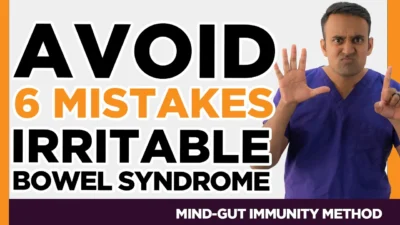Prominent physicians (e.g., Gabor Maté, MD) and authors estimate that trauma accounts for more than 80% of chronic inflammation. This includes digestive dysfunction, immune inflammation, and emotional stress.
Trauma = stress = inflammation = gut microbiome dysfunction and autoimmunity.
There are some studies that predict a nearly 7-fold increase, 700% increase in the incidence of certain autoimmune diseases in individuals that have experienced trauma in their lives.
That’s a lot, and that also means that life experience is more important than genetics as a cause of inflammation.
And if you think trauma doesn’t affect you, just remember that trauma comes in two types:
First, there is CAPITAL T trauma. That’s Trauma with a capital T. This type of trauma includes things like neglect, extreme poverty, racism, bullying, sexual abuse, death of a family member, emotional and physical abuse, medical trauma, and divorce. Here you have an automatic response and a mind-body adaptation to a specific, identifiable, hurtful, and overwhelming life event. This can occur in childhood, or even in adulthood.
Then you have “small t” trauma, and these are more subtle, less memorable, seemingly ordinary events. Maybe it was how you were raised, including your cultural beliefs, and what your parents valued. Trauma with a lowercase “t” is a disconnect from yourself, even in the absence of abuse, or overwhelming threat. It comes from the sorts of emotional connections you had to the people around you. This type of trauma affects nearly everyone and comes from the sorts of emotional connections you had to the people around you.
in this video we’ll be exploring how trauma stress grief anxiety and exhaustion contributes to irritable bowel syndrome not only will we discussing the latest research about irritable bowel syndrome and gut microbiome dysfunction but also propose possible solutions for solving irritable bowel syndrome [Music] hi everyone I’m Dr chanu dasri a surgeon who specializes in reversing inflammation caused by gut microbiome dysfunction my unique approach for reversing symptoms in as little as six weeks is called the Mind gut immunity method and it has helped thousands of patients over the past decade you can find out more by visiting mgiclinic.com now if you watch some of my other videos you know that I’ve been a strong advocate of risk factor modification and reversing the root cause of inflammation caused by irritable bowel syndrome most of my videos have talked about highly technical scientific studies which describe how to prevent gut microbiome dysfunction which is the root cause of most inflammation caused by irritable bowel syndrome we already know that 80 percent of the immune system is contained in the gut and that the intestines also have over a trillion bacteria inside of them if you picked up some recent magazines in the newsstands you’ll see articles like how grief affects gut health even the prominent medical associations have published manuscripts that describe how stress and Trauma are significant drivers of gut microbiome dysfunction seen in conditions such as IBS obviously something like stress trauma grief depression anxiety and exhaustion are sometimes difficult things to measure and that’s why in this video we’ll be exploring how these types of negative emotional states affect our perspective and our decision making in the present the goal here is not to explore the deep dark secrets of the past or dissect out your upbringing that’s what therapists and counselors Are For The Goal here is to bring awareness to how trauma stress anxiety and exhaustion contribute to our health maintenance in the present day we recently added an entire module to the Mind get immunity Academy that presents daily coaching exercises that you can do by yourself or with the help of a mentor or coach to increase your awareness of negative emotional states and stress the great thing is members in my clinic work very closely with our team to help resolve these effects and in a short period of time they achieve uncommon healing so let’s get started why are we even talking about trauma stress anxiety and negative emotion anyways prominent Physicians and authors estimate that trauma accounts for more than 80 percent of chronic inflammation this includes digestive dysfunction immune inflammation and emotional stress trauma leads to stress leads to inflammation which leads to gut microbiome dysfunction and autoimmunity there are even some studies that predict a nearly seven-fold increase that’s a 700 percent increase in the incidence of certain autoimmune diseases in individuals that have experienced trauma in their lives that’s a lot and that also means that life experience is more important than genetics as a cause of inflammation and if you think trauma doesn’t affect you just remember that trauma comes in two types first there’s major trauma that’s trauma with a capital T this type of trauma includes things I can neglect extreme poverty racism bullying sexual abuse death of a family member emotional physical abuse medical trauma and divorce here you have an automatic response and a mind-body adaptation to a specific identifiable hurtful and overwhelming life event this can occur during childhood or even in adulthood then you have small T trauma that’s trauma with a lowercase T and these are more subtle less memorable seemingly ordinary Events maybe it was how you were raised including your cultural beliefs and what your parents value trauma with a lowercase T is a disconnect from yourself even in the absence of something like abuse or overwhelming threat it comes from the source of emotional connections you had to the people around you this type of trauma affects nearly everyone and comes from the source of emotional connections you had to the people around you for example most kids are praised for good behavior and shunned for bad behavior what that teaches the child is that they’re loved only when they’re doing good and they’re not as loved when they express negative emotions or behaviors maybe as a child we were rewarded with more attention when we were happy or doing things that impressed our parents but when we’re misbehaving or crying or expressing Rebellion or negative emotion our parents neglected us punished us guilted us or shamed us and this is quite common another example is that we live in a materialistic capitalistic society which means we work all day long just to afford to buy things and we focus a lot of energy and attention on just gaining resources we therefore praise that type of workaholic hustle mentality another example is maybe we were raised not to offend other people or to be polite or to be encouraged to fulfill our duty and obligations and not let other people down and this can include both family members friends can also include co-workers and social acquaintances so invariably we end up doing things that we don’t really want to be doing like people pleasing and this can lead to certain types of relationship Dynamics or spending all of our time at work functions social obligations and fulfilling family obligations we feel bad if we don’t do these things and we perceive a negative consequence we will result from it but in reality this is a reflection of the disconnect we have from ourselves our internalized perspective is that we are not deserving or worthy of love when we elicit a negative response from others when we should be saying to ourselves we are deserving of Love regardless and should never really ignore our actual needs and desires if we de-prioritize ourselves so much that we don’t even know what our genuine needs are because we’ve become so disconnected from our true selves we lose perspective children often receive the message that certain parts of them are acceptable While others are not which leads to a split in oneself angry children don’t get loved being nice creates acceptance by the parent but later in life you may feel that you are lovable only when you’re doing things well which means pursuing Perfection and a rigid role identification while cutting yourself off from the other more vulnerable parts of yourself you end up making a terrible deal you secure your physical and emotional Survival by relinquishing who you are and how you feel and this carries into adulthood let me share with you a personal story when I was a surgical resident we work long hours 80 to 100 hours a week sometimes we would work for 36 hours straight with no sleep and sometimes we’d be in operating rooms for 12 hours straight with no breaks and this was not just for a few days or months this went on for years with that sort of experience I learned to work through my hunger and thirst I learned to work through my sleep deprivation I learned how to ignore my social plans and emotional needs of my own family I even learn how not to urinate for an entire day now you would think that this sort of experience is not healthy and it isn’t but in order to become a surgeon I had to subject myself to this type of torment and abuse some would call me dedicated others would call me selfless or resilient but these are just euphemisms for enduring trauma and I Justified it to myself by saying my life will have more value when I become a surgeon and can operate on patients because not a lot of people are capable of doing such a thing basically I accepted and blindly participated in a culture of abuse and Trauma to pursue this unrelenting goal and what was the result well I have a successful career and a surgical practice but to this day I sometimes don’t even know when I’m hungry or thirsty or tired I make excuses for not staying in touch with family and friends I make excuses for eating poorly and not exercising I don’t allocate enough time to be in nature or pursue a daily spiritual practice and this is all because I wrongly perceive that there are more pressing matters that deserve my attention in the present and I share with you this very personal experience just to say that no one is immune from trauma and it affects everyone the pursuit of wealth status importance and relevance is motivated by a fear of consequence and is a burden of our belief system in fact I need to consciously think about what I’m doing every single day to avoid this trap so I’m going to attempt to give you some tools that you can use to actively analyze your life so that you can increase awareness first here are some ways to determine if something is traumatic it limits you constricts you diminishes Your Capacity to feel or think or to trust or assert yourself to experience suffering without succumbing to despair or to witness it with compassion it keeps you from becoming overwhelmed by your fear sorrow and Pain by causing you to escape habitually into work compulsive self-soothing or self-stimulating by whatever means you’re compelled to aggrandize yourself or face yourself for the sake of gaining acceptance or to Justify Your Existence you have an impaired capacity to experience gratitude or appreciate Beauty and wonder of life so second so how does the traumatized person act and behave well many of them have an automatic and compulsive concern for the emotional needs of others while ignoring their own needs they also have rigid identification with social roles Duty and responsibility many are overdriven multitasking or hyper responsible based on the conviction that your own self-worth is tied to your ability to provide and give they also have repression of healthy self-protective aggression and anger I tell all my patients you got to be more mean they also have a feeling of personal responsibility of other people’s feelings and feeling the need not to disappoint anyone this is all basically the opposite of how a child Acts newborns for example they don’t care about expressing their feelings they just cry and they don’t think twice but unfortunately some of these repressive Behavior patterns are not only normalized but celebrated in this culture many people think of these characteristics as being admirable strengths not weaknesses they sign names to them like compassion honor diligence kindness generosity but the reality is there’s a great sacrifice that occurs in the individual that displays these qualities so I invite you to partake with me in this process to naturally move towards wholeness to truly explore how trauma and self-dissociation and splitting off from parts of your true self negatively affects your life and health and what you can do to change this I am asking you to recover the lost parts of yourself and Define area in your life in which your wholeness is not yet fully realized or lived out and to accomplish this you need a moment by moment commitment to do just that so let’s dive in and try to figure all of this out we’ve created a series of tools and exercises to help bring awareness to how trauma affects your life so just a bit of background first you know and suspect there’s a problem an example can be you have inflammation or digestive dysfunction or autoimmune disease next you know why it’s a problem because you experience real consequences you also know why it became a problem maybe you had certain beliefs and perspectives that led you to make certain Life Choices so third the question is what can you do about it and here’s where you examine excuses for inaction or not changing and you work to improve awareness and you may work with a mentor or a coach all right that was a lot and I appreciate you making it to the end of this video let me just say this I recently started reading a lot about stress and Trauma and negative emotional states contributing to inflammation and irritable bowel syndrome and I thought it would be very valuable for members in the mind gun immunity Clinic to have a devoted Focus towards increasing awareness of these factors in their own lives an author that I think also very strongly advocates for this is Canadian physician Gabor mate and that’s why we’ve recently added a trauma awareness coaching section to the Mind get immunity Clinic because it’s very important to identify how these factors contribute to decision making perspective and behavior in the present day having a reliable methodology to reduce lasting results is necessary for achieving uncommon healing from irritable bowel syndrome and the only way to do this is to increase awareness as always if you thought this video was helpful please give me a like and follow also share this video with anyone you know that might be dealing with stress and eczema finally feel free to check out some of my other videos including success stories on this channel or at mgiclinic.com
thank you







